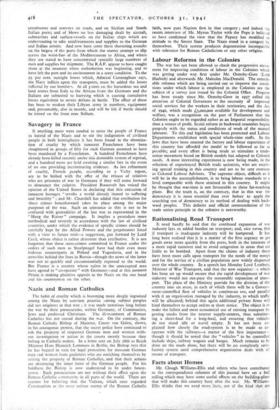Labour Reforms in the Colonies
The war has not been allowed to check the progressive move- ment for improving conditions of labour in the Colonies which was getting under way first under Mr. Ormsby-Gore (Lord Harlech) and afterwards Mr. Malcolm MacDonald. The remark- able reforms which are being carried out to improve the condi- tions under which labour -is employed in the Colonies are the subject of a survey just issued by the Colonial Office. Progress has been steady since Mr. Ormsby-Gore in 1937 called the attention of Colonial Governors to the necessity of improved social services for the workers in their territories; and the Act of 1940, which made £5,00o,0oo available for development and welfare, was a recognition on the part of Parliament that the Colonies ought to be regarded rather as an Imperial responsibility than a source of profit. Social reform in backward countries begins properly with the status, and conditions of work of the manual labourer. To this end legislation has been promoted and Labour Departments established with special whole-time staffs. In the laws that have been enacted the factory and labour experience of this country • has afforded the model to be followed as far as possible; and every effort is being made to stimulate a trade- union movement based on British models but adapted to Colonial needs. A most interesting experiment is now being made, in the selection of experienced British trade unionists, who are -receiv- ing special training in this country and are to be sent overseas as Colonial Labour• Advisers. The supreme object, difficult as it will be in the accomplishment, is to bring labour standards to a level comparable with those attained in this country. It might be thought that war-time is not favourable to these far-reaching plans. But the truth is, on the contrary, that in this war for democracy it is more essential than ever before to apply the searching test of democracy to its method of dealing with back- ward peoples. This definite and official commendation of the trade union principle in the colonies is noteworthy.






















 Previous page
Previous page